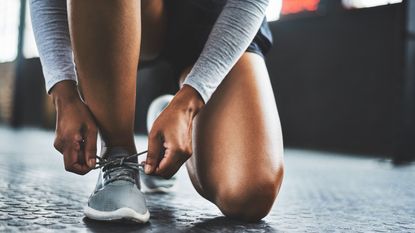How long do running shoes last?
You may be surprised how long running shoes actually last!


If you’re a regular runner, whether it’s on a treadmill or outside, you may be thinking "how long do running shoes last?" Here's everything you need to know about when to swap old running shoes for a new pair.
Finding the best running shoes for women can be a difficult task, so when we do finally find a comfy pair of trainers, we never want to part with them. But, to get the most out of your running – and to avoid unnecessary injury – you need to know how long your running shoes will actually last.
To help you figure this out, we spoke to top running experts who have given us a detailed picture of how many miles you should be running in your trainers. Plus, the signs to take note that show it's time to head back to the shop and seek out another pair of trusty trainers.
How long do running shoes last?
Depending on how often you run and whether you know how to clean running trainers, you should be looking at getting new running shoes every six months to a year – but because not everyone runs with the same regularity, this schedule is normally counted in miles rather than time.
“The average is 400-500 miles,” says fitness coach Emma Kirk Odunubi. “For most runners who cover about 20 miles a week, that’s roughly every six months or so.”
If you run less than this, work out your weekly average distance and then add it up over the months. It will give you a solid idea of when you need to start thinking about looking for a new pair of running shoes.
Why you need to track your mileage
With the wonders of new technology, it’s now easier than ever to track how many miles you’re running using one of the best fitness trackers out there. This is not only good for your training, but the life of your running shoes too. As well as tracking your heart rate and your route, all fitness trackers – such as the Fitbit or Apple Watch – will give you a regular rundown of how many miles you’ve run.
Sign up for the woman&home newsletter
Sign up to our free daily email for the latest royal and entertainment news, interesting opinion, expert advice on styling and beauty trends, and no-nonsense guides to the health and wellness questions you want answered.
Try and reset your total mileage at the same time as replacing your running shoes. Or, note down when you bought them and use your tracker to keep track of how many miles you’ve run since.

What to look for in your shoes
If you’re still unsure how long your running shoes will last, then make sure you inspect your trainers regularly, and keep an eye on how your body feels when you run.
- WEAR & TEAR: Emma says that if you want to get an understanding of your shoes’ wear and tear, you need to ask yourself some basic questions. “Inspect your shoe – does the heel still give you a firm grip once you have laced the shoe? Is the upper material baggy and not as fitted? Has the tread on the sole of the shoe worn away? If so, these are signs that you’ll need a replacement soon.”
- WORN INSOLES: Another thing to watch out for, says Bente Smith-Rewse, founder of Enertor, is worn out insoles. “If you remove them from the shoe you’ll start to see where they’re compressing, perhaps on the forefoot or in the heel depending on how you run. If one part of the insole, or the insole for a particular foot, is considerably more worn or compressed this is an indication that you have extra pressure in this point. It might mean you need to get some insoles or trainers with more support.”
Why you should only use your running shoes for running
This might seem odd at first but, essentially, you should avoid wearing your running shoes for other forms of exercise. The reason for this is simple, the more general usage will not only decrease the lifespan of your shoe, but it could also damage your feet.
As Emma explains, there is a difference between running shoes and shoes made for HIIT and gym-style training. “From its support to the way the heel holds your foot; the way the upper material gives you that close fit and the direction of the tread – everything about a running shoe is catered to a forward running motion.
“Gym-style trainers are made for functional, multi-directional movement and are, therefore, built with supportive layers for lateral movement. So always choose a training shoe for training and a running shoe for running. It will actually increase the life of both pairs of shoes.”
While Jonathan Quint at Saucony agrees, “running shoes are designed to take impact on roads, and for forward motion. A little alternative activity is fine, but too many classes and they’ll start to wear out quicker.”
How to take care of your running shoes
Of course, some of the responsibility of how long your running shoes last lies with you. If you leave your training kit in smelly gym bags or the boot of your car for days on end, they’ll wear out more quickly than they normally would.
Try to keep your shoes in optimum conditions. Once you’ve run in them try to store them in a cool, dry place. This will help them to dry out. If they’re not cared for they could lose shape and start to rub when you run, this means you’ll have to get a new pair well before you’ve run the miles of which they’re worthy.
With thanks to fitness coach Emma Kirk Odunubi , Bente Smith-Rewse, founder of Enertor and Jonathan Quint at Saucony
Sarah is a freelance journalist - writing about the royals and celebrities for Woman & Home, fitness and beauty for the Evening Standard and how the world of work has changed due to the pandemic for the BBC.
She also covers a variety of other subjects and loves interviewing leaders and innovators in the beauty, travel and wellness worlds for numerous UK and overseas publications.
As a journalist, she has written thousands of profile pieces - interviewing CEOs, real-life case studies and celebrities - interviewing everyone from Emma Bunton to the founder of Headspace.
-
 These 9 nude Christmas manicures are guaranteed to bring chic festive cheer
These 9 nude Christmas manicures are guaranteed to bring chic festive cheerFor festive but not tacky nail looks, these neutral designs are perfect for celebrating the holidays in (subtle) style...
By Naomi Jamieson Published
-
 What to pack for the ultimate camping experience, no matter the weather
What to pack for the ultimate camping experience, no matter the weatherCamping isn't just about the essentials - it's the small touches of comfort that make the experience one worth repeating. Here's what to bring...
By Grace Walsh Published